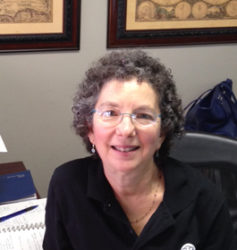CLL The Cure is in the Grocery Store
Posted by: Denise on: October 5, 2018
- In: CLL Diet | Lifestyle
- 15 Comments
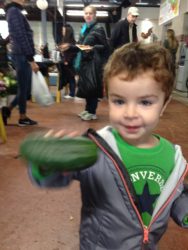
Shopping for a future pickle at our local Farmer’s Market.
Last night my husband and I had what we call “fast food†for dinner. Don’t raise your eyebrows; it’s not what you think. I tend to cook an elaborate dinner, in quantity suitable for leftovers, about three times a week. After that, we either eat leftovers combined with freshly steamed vegetables or a raw salad, or we make “fast food.†In this case, it was slow-fried eggs, corn on the cob, and steamed brussels sprouts.
Why is this fast? Dinner took considerably less than a half hour, and it was delicious! Before I get into recipes or cooking techniques (like what is “slow-fried�) I need to make another point. Success in the kitchen, as measured by truly healthy and nutritious meals and snacks that taste good, require more than kitchen skills. They require shopping!
Shopping Time!
Yes, if you want to beat this CLL thing, and you want to do it naturally, you have to spend some time in the supermarket and, if available, your local farmer’s market. This is another case of failing to plan is planning to fail. You have to shop the stores in your neighborhood until you find the best places for abundant organic fruit and vegetables. Yes, I do eat eggs, chicken, fish, and sometimes even beef, but I still eat a plant-based diet. The animal protein is more of a side dish.
Times have changed.
It wasn’t long ago that I had to go to health food stores for a fairly limited and often dried-out selection of fresh veggies. Today, even the corporate behemoths (like Kroger, here in SE Michigan) have an impressively well-stocked organic produce section. My personal choices these days are Kroger, Trader Joe’s, and the local Royal Oak farmer’s market. They all have their good and bad points. We (hubby and I) often go to two markets in one evening for a quick, targeted shopping trip. We know each store’s layout and can get in and out quickly. Even with these quick trips, keep in mind that you will likely have to do this at least twice a week. Some vegetables keep only so long, and if you’re doing it right you’ll find that your refrigerator has an ever-dwindling selection of fresh produce
Another time saver is stopping in on the way home. Hubby does this more than me, especially in the summer, as I take my dog, Tina, to work, and I don’t like to leave her in the car unless it’s cold outside. (It’s cold outside today now…sigh.)
Another side note: sometimes your organic produce choice won’t look so good. Sometimes conventional might be a better choice, in which case please soak in 50-50 white vinegar and water to cleanse as much pesticide residue as possible. Another choice to shop more than one market. If the selection at the first isn’t so good, you still have one more chance to get your organics.
And where do I buy all my animal protein?
This is not an answer set in stone. We still buy eggs from our local farmer’s market. They are consistently better than the organic eggs at any supermarket. The yokes are orange rather than yellow, and they are delicious! In the past my meat sources have been Trader Joe’s, Whole Foods, farmer’s market, other specialty stores. You have to continually be aware and look for the best places. Your local Weston A Price chapter can help you source local good foods.
The point is to BE PREPARED.
Shop ahead and get the best organic veggies and fruits in season. You can rinse and freeze the fruit. Store the leafy greens and other veggies in a loosely closed plastic bag so that some air can get in. This works for me, and it’s fairly simple. Simple is good. The more complicated you make your food gathering, the more of a task it will seem.
Of course, it’s not all about veggies and fruit. Also keep stocked with organic pastured free-range chicken and grass-fed pastured beef, wild caught white fish and salmon, and pastured free-range eggs. An extra freezer is wonderful, if you can afford it. Beyond that are the seasonings and sauces. I’m honestly not the most skilled cook, but I do keep tapioca starch (flour) on hand for mixing with water and seasonings and pouring over a stir fry when almost done. It turns into a delightful gravy reminiscent of a Chinese food dish.
Also keep organic, extra-virgin olive oil in the cupboard, along with apple cider vinegar, other vinegars (I love Eden-brand umi-plum…yum!) and balsamic vinegar as well. (all organic, please) A supply of fresh lemon is great to add to dressings and sauces, and also to squeeze into a morning glass of water for your alkalinity and digestion.
Coming soon to a blog near you!
In another post soon, I will write about some of my favorite cooking techniques. Not only should your vegetables be organic and fresh, and your animal protein free-range, organic and pastured, but nothing should be over cooked at temperatures above 300-degrees Fahrenheit.  This is a challenge I’ve managed to overcome by checking out advice on Google and youtube, and by experimenting on my own. I am happy to share and will do so soon.
In the meantime, get out to your local market and start checking out the best sources and prices. You’re in this for the long haul. As environmental doctor Sherry Rogers wrote, “The Cure is in the Kitchen.†I would add, in order for that to happen you have to get to your grocery store first!
Happy shopping! – Denise
PS A good cancer cookbook is The Cancer Fighting Kitchen. There is an earlier addition at a greatly reduced cost on Amazon.
CLL Bad Blood Test: Now What?
Posted by: Denise on: March 18, 2018
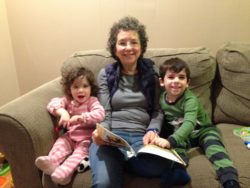
Reading time with Naomi and Moshe. Life is good!
Dear CLL Reader,
And…here’s the important part: at some point I learned that if my doctor wasn’t sounding alarm bells, then I just wasn’t going to get nervous either. What I also learned was to take a day (maybe two) to allow myself to be upset and depressed. Then it was time to do research and find ways to improve the blood test scores. So you’re on the right track by writing me. (Although by no means should I be your only source of answers.) Check each of your markers and do a Internet search. There are many examples below.
CLL WBC natural treatment.I just did this search and came up with this page:Â http://
The next question is: do you cook “low and slow”? This means at low temperature for a longer time, making certain never to burn or totally dry our your food. If you’ve been grilling or overcooking food, this is a place you can make an improvement.
Eat bone broth soup and fermented veggies. This is more advanced, as in not what people will start to do the moment they decide to take control. However, learning to make your own fermented vegetables provides probiotics that far exceed the numbers in those pills we buy online or in the health food stores! See this article: http://darwinian-medicine.com/ask-eirik-how-many-bacteria-are-there-in-sauerkraut/. And at least three alternative doctors/practitioners told me personally to have bone broth soup specifically for leukemia. These are both healing foods. The Weston Price Foundation is all about both these foods. They have local chapters that teach classes on how to make your own sauerkraut and other veggies, and also how to make bone broth soup.
D’limonene and CLL. Are you eating citrus? I was doing very well eating whole oranges 5X/week. I had them in my smoothie. (Organic, of course.) (I’m not able to do that anymore for a non-CLL reason, but this is a very healthy thing to eat. The peel has d-limonene, which is specifically anti-leukemia.) So if you’re already having a smoothie, add that orange (or lemon or grapefruit or lime). Here is a study about that from a search on “Dlimonene Leukemia”: https://www.ncbi.
Vitamin D3 and CLL. What about vitamin D3? have you had it tested? Your level in a Vit D hydroxy test should be somewhere between 70 and 100, in order to battle cancer. I takek 9000 IU of vit D3 every day, and test my levels about 4X a year. (It’s a blood test.) I also take at least one vitamin K2 pill/day to balance out my vitamin D3!There are also studies that indicate that D3 helps people with CLL. Here is one from a “Vitamin D Leukemia” search: https://www.
Other ways to get well. Are you getting enough sleep? Are you avoiding toxins? Are you taking Peak Immune by Daiwa? (check out LuckyVitamins.com, for the best deal.) I have a comprehensive list of what to do in this article: http://www.
Remember that the C in CLL is for Chronic. Generally, this is a slow-moving illness, giving us time to work on our wellness. An important part of getting well is to think of yourself as well, and to expect to be here for the long haul. Visualize yourself in your eighties. Think of what life will be like then. I know it’s really hard to conquer the fear, but there is joy and life on the other side! I remember when I first became Macrobiotic in 2005. That is what helped me conquer the fear. At that time, my WBC had jumped into the 20s, so like you, I felt the end was near. It wasn’t! But early July, it will be 17 years and counting. If it’s like this for me, it can be like this for you, too. Hang in there, and allow yourself some happy thoughts. Do something fun and get away from it for a while, and then double down with one or two new things to add to your wellness plan.
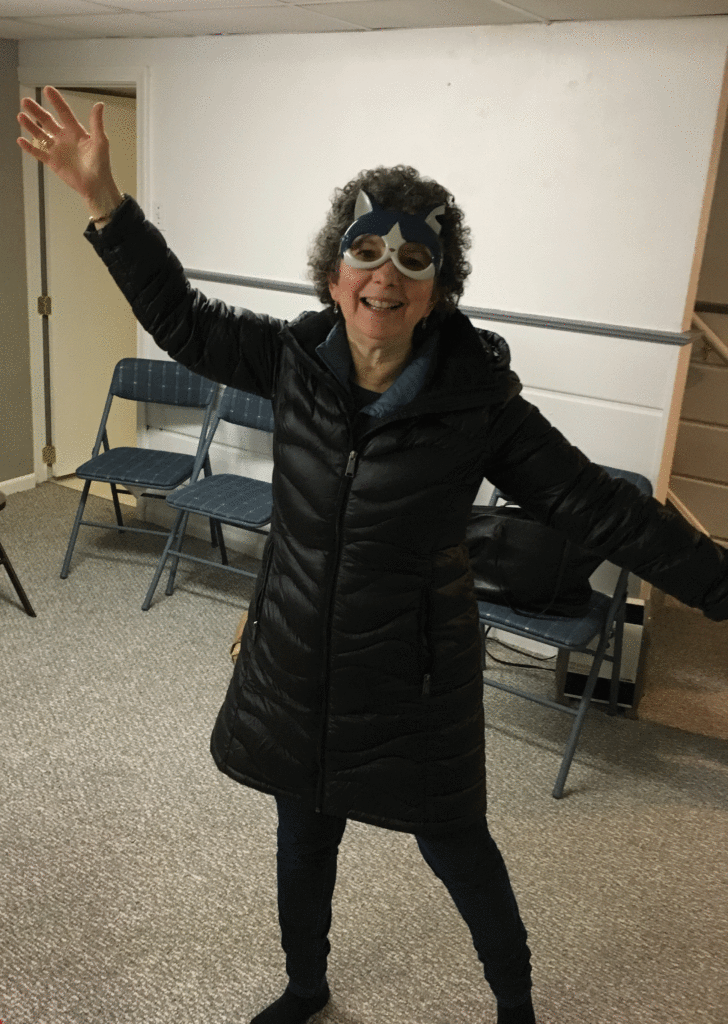
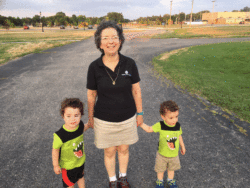
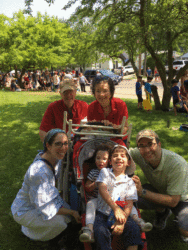
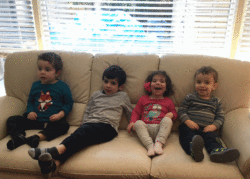
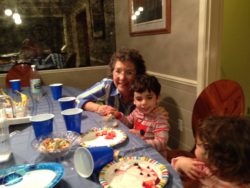 For whatever reason, when I was first diagnosed with chronic lymphocytic leukemia by my original hematologist, he advised that I keep the news to myself.
For whatever reason, when I was first diagnosed with chronic lymphocytic leukemia by my original hematologist, he advised that I keep the news to myself.